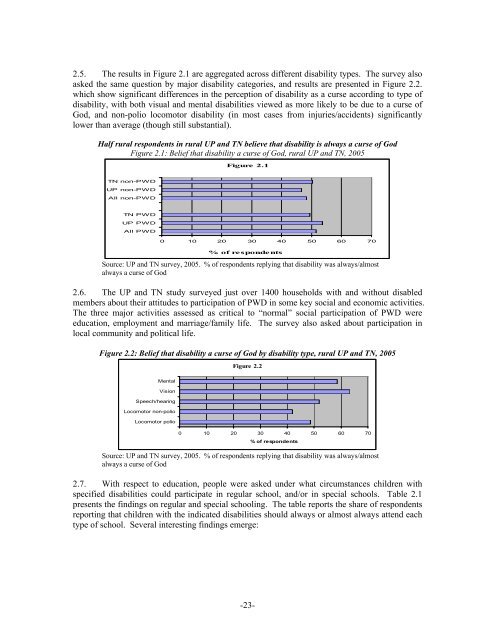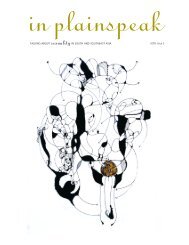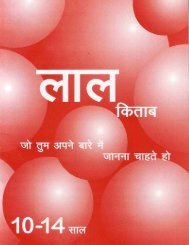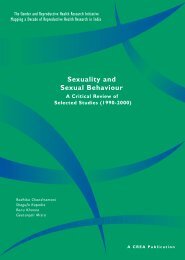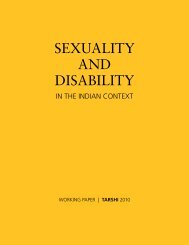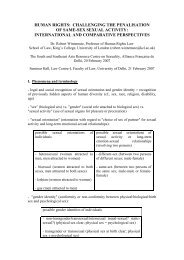People with Disabilities in India: From Commitment to Outcomes
People with Disabilities in India: From Commitment to Outcomes
People with Disabilities in India: From Commitment to Outcomes
You also want an ePaper? Increase the reach of your titles
YUMPU automatically turns print PDFs into web optimized ePapers that Google loves.
2.5. The results <strong>in</strong> Figure 2.1 are aggregated across different disability types. The survey also<br />
asked the same question by major disability categories, and results are presented <strong>in</strong> Figure 2.2.<br />
which show significant differences <strong>in</strong> the perception of disability as a curse accord<strong>in</strong>g <strong>to</strong> type of<br />
disability, <strong>with</strong> both visual and mental disabilities viewed as more likely <strong>to</strong> be due <strong>to</strong> a curse of<br />
God, and non-polio locomo<strong>to</strong>r disability (<strong>in</strong> most cases from <strong>in</strong>juries/accidents) significantly<br />
lower than average (though still substantial).<br />
Half rural respondents <strong>in</strong> rural UP and TN believe that disability is always a curse of God<br />
Figure 2.1: Belief that disability a curse of God, rural UP and TN, 2005<br />
Figure 2.1<br />
TN non-PWD<br />
UP non-PWD<br />
All non-PWD<br />
TN PWD<br />
UP PWD<br />
All PWD<br />
0 10 20 30 40 50 60 70<br />
% of respondents<br />
Source: UP and TN survey, 2005. % of respondents reply<strong>in</strong>g that disability was always/almost<br />
always a curse of God<br />
2.6. The UP and TN study surveyed just over 1400 households <strong>with</strong> and <strong>with</strong>out disabled<br />
members about their attitudes <strong>to</strong> participation of PWD <strong>in</strong> some key social and economic activities.<br />
The three major activities assessed as critical <strong>to</strong> “normal” social participation of PWD were<br />
education, employment and marriage/family life. The survey also asked about participation <strong>in</strong><br />
local community and political life.<br />
Figure 2.2: Belief that disability a curse of God by disability type, rural UP and TN, 2005<br />
Figure 2.2<br />
Mental<br />
Vision<br />
Speech/hear<strong>in</strong>g<br />
Locomo<strong>to</strong>r non-polio<br />
Locomo<strong>to</strong>r polio<br />
0 10 20 30 40 50 60 70<br />
% of respondents<br />
Source: UP and TN survey, 2005. % of respondents reply<strong>in</strong>g that disability was always/almost<br />
always a curse of God<br />
2.7. With respect <strong>to</strong> education, people were asked under what circumstances children <strong>with</strong><br />
specified disabilities could participate <strong>in</strong> regular school, and/or <strong>in</strong> special schools. Table 2.1<br />
presents the f<strong>in</strong>d<strong>in</strong>gs on regular and special school<strong>in</strong>g. The table reports the share of respondents<br />
report<strong>in</strong>g that children <strong>with</strong> the <strong>in</strong>dicated disabilities should always or almost always attend each<br />
type of school. Several <strong>in</strong>terest<strong>in</strong>g f<strong>in</strong>d<strong>in</strong>gs emerge:<br />
-23-


